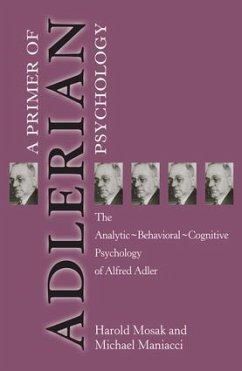
Alfred Adler, the Forgotten Prophet
A Vision for the 21st Century
Versandkostenfrei!
Versandfertig in 1-2 Wochen
87,99 €
inkl. MwSt.

PAYBACK Punkte
44 °P sammeln!
Adler, Freud, and Jung were the key figures in the development of psychology as we know it. Yet, while Freud and Jung are widely studied and debated, Adler is far less well known. Nonetheless, as Loren Grey demonstrates, some of Adler's novel early precepts are valuable tools for personality diagnosis, even to this day. Examples include his belief in the social equality of all human beings, regardless of race, position, class, or gender; that all human behavior is logical-however bizarre or psychotic its goal may be; that mistaken precepts about others, being learned, can be unlearned; and in ...
Adler, Freud, and Jung were the key figures in the development of psychology as we know it. Yet, while Freud and Jung are widely studied and debated, Adler is far less well known. Nonetheless, as Loren Grey demonstrates, some of Adler's novel early precepts are valuable tools for personality diagnosis, even to this day. Examples include his belief in the social equality of all human beings, regardless of race, position, class, or gender; that all human behavior is logical-however bizarre or psychotic its goal may be; that mistaken precepts about others, being learned, can be unlearned; and in the importance of understanding the dynamics behind the family interactions with particular emphasis on the ordinal position of each child in the family constellation. Many of these ideas, though ignored or rejected by the early Freudians and Jungians, have become part of the post-Freudian movements in psychology and counseling. In this book, Grey systematically examines the life and ideas of Alfred Adler as well as the approaches taken by his leading students. Many of Adler's early supporters felt that he was 100 years ahead of his time; Grey demonstrates that many of his approaches can serve humanity well in the new millennium. This text provides an important survey for students, scholars, and practitioners of psychology.














